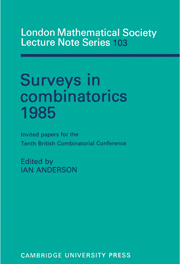Book contents
- Frontmatter
- Contents
- Preface
- Combinatorics and Ramanujan's “Lost” Notebook
- Irregularities of distribution and combinatorics
- Adaptive algorithms for communications
- Random flows: network flows and electrical flows through random media
- On greedy algorithms that succeed
- {0, 1*} distance problems in combinatorics
- Detachments of graphs and generalised Euler trails
- Graph minors – a survey
- Index
Combinatorics and Ramanujan's “Lost” Notebook
Published online by Cambridge University Press: 05 May 2013
- Frontmatter
- Contents
- Preface
- Combinatorics and Ramanujan's “Lost” Notebook
- Irregularities of distribution and combinatorics
- Adaptive algorithms for communications
- Random flows: network flows and electrical flows through random media
- On greedy algorithms that succeed
- {0, 1*} distance problems in combinatorics
- Detachments of graphs and generalised Euler trails
- Graph minors – a survey
- Index
Summary
Introduction
L. J. Rogers' paper (Rogers; 1894) which contains the Rogers–Ramanujan identities together with their proof was ignored for 20 years before Ramanujan came across it while leafing through old volumes of the Proceedings of the London Mathematical Society. In the interim, Ramanujan had discovered the Rogers–Ramanujan identities empirically, and they were making the rounds as major unsolved problems (cf. Hardy; 1940, p. 91). This is undoubtedly one of the very few times that a set of significant unsolved problems was solved 20 years before it was posed.
The most obvious reason Rogers' paper lay buried is that it is page after page of q–series identities with the Rogers–Ramanujan identities sneaking past in mild disguise on page 10 of this tour de force.
As more discoveries were made, the subject became even less readable. The Rev. F. H. Jackson was one of the early pioneer q–series researchers. His papers also read much like Rogers'. It is not surprising to read in Jackson's obituary (Chaundy (1962)); “Once (with a whimisical smile one imagines) he [Jackson] recounted the occasion of his quarrel with our Society [the L.M.S.]: he had read a paper when someone remarked: ‘Surely, Mr. President, we have heard all this before.’ He strode from the room and never darkened our pages again.” As it turned out this critical remark was directed at what was, in fact, Jackson's most valuable paper.
- Type
- Chapter
- Information
- Surveys in Combinatorics 1985Invited Papers for the Tenth British Combinatorial Conference, pp. 1 - 24Publisher: Cambridge University PressPrint publication year: 1985
- 8
- Cited by

